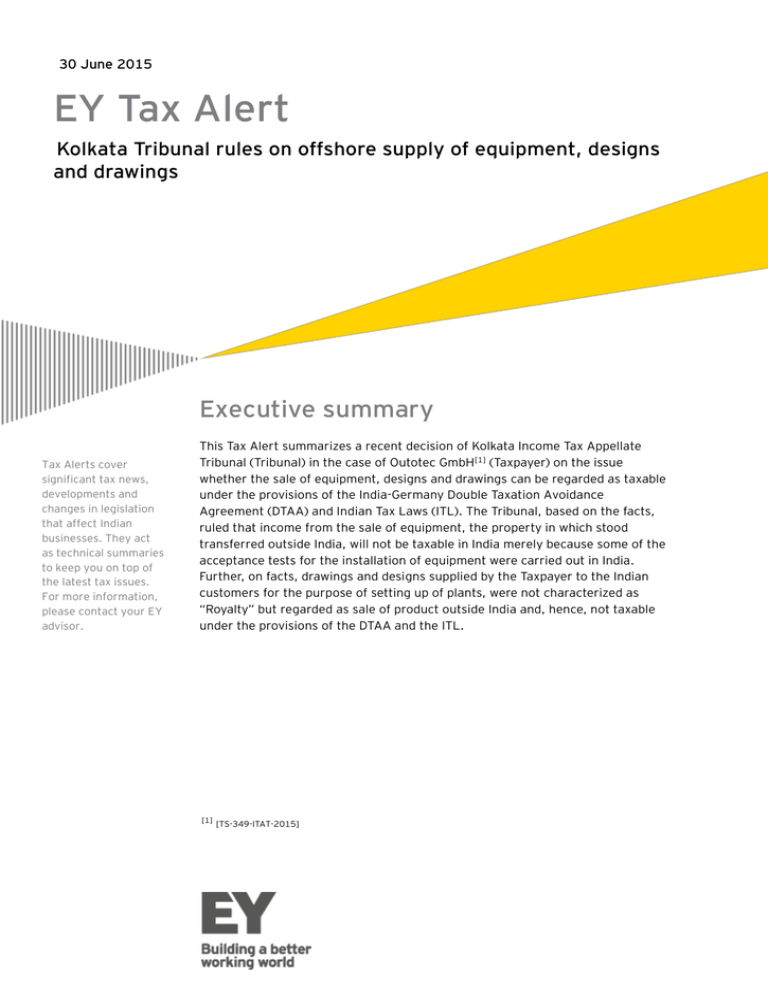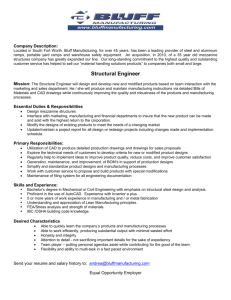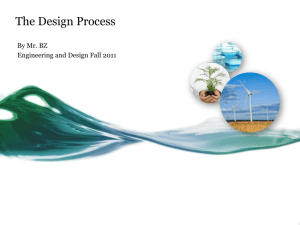
30 June 2015
EY Tax Alert
Kolkata Tribunal rules on offshore supply of equipment, designs
and drawings
Executive summary
Tax Alerts cover
significant tax news,
developments and
changes in legislation
that affect Indian
businesses. They act
as technical summaries
to keep you on top of
the latest tax issues.
For more information,
please contact your EY
advisor.
This Tax Alert summarizes a recent decision of Kolkata Income Tax Appellate
Tribunal (Tribunal) in the case of Outotec GmbH[1] (Taxpayer) on the issue
whether the sale of equipment, designs and drawings can be regarded as taxable
under the provisions of the India-Germany Double Taxation Avoidance
Agreement (DTAA) and Indian Tax Laws (ITL). The Tribunal, based on the facts,
ruled that income from the sale of equipment, the property in which stood
transferred outside India, will not be taxable in India merely because some of the
acceptance tests for the installation of equipment were carried out in India.
Further, on facts, drawings and designs supplied by the Taxpayer to the Indian
customers for the purpose of setting up of plants, were not characterized as
“Royalty” but regarded as sale of product outside India and, hence, not taxable
under the provisions of the DTAA and the ITL.
[1]
[TS-349-ITAT-2015]
Facts
►
those tests. Hence, certain portion of the
sale price should be taxable in India.
The Taxpayer, a German Company, is
engaged in the business of providing
innovative and environmentally sound
solutions to customers in metals and
minerals processing industry. During the
relevant tax year, the Taxpayer supplied
equipment to several Indian companies
(customers) on export sale basis. The
equipment is to be a part of whole plant
comprised various designs, electrical and
automated systems. Additionally, the
Taxpayer constituted a supervisory
permanent establishment (PE) in relation
to certain projects undertaken in India,
unrelated to the above contract.
►
The designing, procurement of material,
fabrication and manufacturing of
equipment was undertaken outside India,
which was sourced from third party
vendors based outside India. The
Taxpayer was not involved in the
manufacturing of equipment.
►
The terms of the contract for supply of
equipment were :
►
►
►
►
►
►
►
Equipment was sold on export sale basis
and the title/ownership was transferred
outside India.
Majority of the payment (80% - 85%) for
each part of shipment was payable upon
delivery of equipment on Free-on-Board
(FOB) foreign port of shipment once
shipping and other documents are sent
to the customer.
Payments were made through
irrevocable letter of credit.
Inspection of the equipment was to be
taken place outside India (by the
customer).
Balance was payable outside India after
satisfactory completion of certain tests
in India and after issue of acceptance
certificate by the customer.
Customer is entitled to liquidated
damages on non-fulfilment of the
performance guarantee
parameters/values.
Based on contractual terms, the Tax
Authority contended that, as per the
contract, conclusion of sale is subject to
various acceptance tests at the
customer’s site in India and certain
percentage of the payment (15%) is
payable upon successful completion of
►
Additionally, the Taxpayer provided basic
engineering packages to customers. By
way of short facts, it was noted as
follows: “Basic engineering includes sale
of designs and drawings to the customers
that pertain to the location of plant,
layout drawings, placement of various
equipment, types of equipment to be
installed, process description,
manufacturing of indigenous equipment
in India etc. that are needed as per
specifications by the customers to erect
the plant”.
►
The Tax Authority regarded the above
designs related payments as royalty and
not sale of copyrighted article on the
basis that the customers were given the
right to use the process and information
and there was a restriction on the
intellectual property in designs and
drawings, which vested with the
Taxpayer.
►
The findings of the Tax Authority were
upheld by the Dispute Resolution Panel
(DRP). Aggrieved, the Taxpayer filed an
appeal before the Tribunal.
Tribunal’s Ruling
Taxability of offshore supply of
equipment
The Tribunal, based on the following, ruled
that the sale of equipment was not taxable in
India:
►
Based on the facts (i) all the activities
relating to designing, fabrication and
manufacturing took place outside India,
(ii) sale of equipment also took place
outside India on principal to principal
basis between unrelated parties; (iii)
title/ownership in the equipment was
transferred outside India; (iv) the
consideration was received outside India;
(v) majority of the payment for shipment
was payable upon delivery of equipment
on FOB basis; (vi) inspection of
equipment took place outside India etc.,
the Tribunal concluded that the supply of
equipment was offshore and, hence, the
same was not taxable in India.
►
Reliance in this regard was placed on
various Supreme Court[2] and lower court
decisions[3].
►
On the aspect of various acceptance
tests that were to be conducted in India,
the Tribunal ruled that the acceptance
tests are part of normal commercial
arrangements and partake the character
of trade warranties. The balance
payment of contract price, which is
receivable by the Taxpayer upon
completion of the tests is a deferred
payment in the nature of warranty and
cannot be construed to mean that the
acceptance of goods took place in India.
The act of deferred payment has also
been specifically provided in the meaning
of ‘sale’ under the Central Sales Tax Act,
1956 and does not have any impact on
the sale of goods per se.
Breach of warranty could result in
payment of damages and does not by
itself mean that the property/title in the
goods did not pass to buyer outside
India. The clause of acceptance tests and
liquidated damages were nothing but
merely in the nature of warranty
provision.
►
outside India; (iv) the design and
drawings sold by the Taxpayer were used
by the Indian customers for internal
business purpose of setting up of their
plants and not for any commercial
exploitation, the Tribunal ruled that the
same was in the nature of sale of designs
and drawings, which has also been
effected outside India[4] .
►
Further, the basic engineering packages
sold by the Taxpayer have been largely
designed on the basis of standard
technologies available with it and
modified based on customer’s
requirement[5]. The consideration was for
the sale of product, which is embedded
in the plant set up by the Indian
customers and does not constitute
royalty but is in the nature of business
income.
►
Retaining intellectual property in designs
and drawings is similar in nature to the
retaining of patented rights in any
goods/machinery. Restriction on the
intellectual property in designs and
drawings beyond the purpose of setting
up a plant in India does not change the
character of the transaction from the
sale of the product to the use of
licence/know-how.
►
Designs and drawings sold were not used
by Indian customers for any commercial
exploitation. Accordingly, the designs
and drawings sold tantamount to the use
of copyrighted article rather than use of
a copyright to be regarded as royalty.
►
Reliance was placed on the Supreme
Court ruling in the case of Scientific
Engineering House Pvt Ltd[6], wherein
drawings and designs were regarded as
plant for depreciation purpose, and held
that the designs and drawings can be
regarded as plant and, hence, partake
the character of a product.
Taxability of designs and drawings
The Tribunal, for the reasons enunciated
below, ruled that provisioning of designs and
drawings was in the nature of sale and not
royalty:
Based on the various features of the
contract, i.e., (i) technologies are
developed after undertaking various
research and development activities; (ii)
designs and drawing are largely the
products of the aforesaid technologies
that are sold to its Indian customers after
being modified to meet their
requirements; (iii) modification activities
have been performed by the Taxpayer
►
[2]
[4]
Ishikawajima-Harima Industries [288 ITR 408(SC)] and
Hyundai Heavy Industries [291 ITR 482 (SC)]
[3]
It appears that designs were considered integrally connected
with the sale of equipment.
[5]
The extent of modification is unclear in the decision.
[6]
[156 ITR 86 (SC)]
Ericsson A.B. [343 ITR 470(Del)], Nokia Network OY [253 CTR
417(Del)], LG Cable Ltd [237 CTR 438(AAR)] and Hyosung Corpn
In Re [314 ITR 343(AAR)]
►
Additionally, the Tribunal ruled that in
absence of any connection between the
supervisory PE of the Taxpayer in India
and the offshore supply activity, the
consideration for offshore supply cannot
be regarded as attributable to the PE in
India.
Comments
The Tribunal ruling has reiterated
that when the title in an equipment
is transferred outside India the sale
of equipment cannot be taxed in
India merely because some of the
tests for the installation of
equipment have been carried out in
India. Furthermore, the decision
also provides guidance on taxability
of designs and reiterates that a
restriction on the intellectual
property in the designs and
drawings does not change the
character of the transaction from
sale of product to the use of
license/know-how. One may note
that the Tribunal has not looked into
the aspect of whether the supply of
designs and drawings could be
regarded as a service contract and,
hence, one may evaluate the same
based on the facts of the case.
Our offices
Ernst & Young LLP
Ahmedabad
2nd floor, Shivalik Ishaan
Near. C.N Vidhyalaya
Ambawadi,
Ahmedabad – 380 015
Tel: + 91 79 6608 3800
Fax: + 91 79 6608 3900
Mumbai
14th Floor, The Ruby
29 Senapati Bapat Marg
Dadar (west)
Mumbai – 400 028
Tel + 91 22 6192 0000
Fax + 91 22 6192 1000
Bengaluru
6th , 12th & 13th floor
“U B City” Canberra Block
No.24, Vittal Mallya Road
Bengaluru – 560 001
Tel: + 91 80 4027 5000
+ 91 80 6727 5000
Fax: + 91 80 2210 6000
+ 91 80 2224 0695
5th Floor Block B-2,
Nirlon Knowledge Park
Off. Western Express Highway
Goregaon (E)
Mumbai – 400 063
Tel: + 91 22 6192 0000
Fax: + 91 22 6192 3000
Prestige Emerald, No. 4,
1st Floor, Madras Bank Road,
Lavelle Road Junction,
Bangalore - 560001
Chandigarh
1st Floor
SCO: 166-167
Sectr 9-C, Madhya Marg
Chandigarh – 160 009
Tel: + 91 172 671 7800
Fax: + 91 172 671 7888
Chennai
Tidel Park,
6th & 7th Floor
A Block (Module 601,701-702)
No.4, Rajiv Gandhi Salai
Taramani
Chennai – 600 113
Tel: + 91 44 6654 8100
Fax: + 91 44 2254 0120
Hyderabad
Oval Office
18, iLabs Centre,
Hitech City, Madhapur,
Hyderabad – 500 081
Tel: + 91 40 6736 2000
Fax: + 91 40 6736 2200
Kochi
9th Floor “ABAD Nucleus”
NH-49, Maradu PO,
Kochi – 682 304
Tel: + 91 484 304 4000
Fax: + 91 484 270 5393
NCR
Golf View Corporate
Tower – B
Near DLF Golf Course,
Sector 42
Gurgaon – 122 002
Tel: + 91 124 464 4000
Fax: + 91 124 464 4050
6th floor, HT House
18-20 Kasturba Gandhi Marg
New Delhi – 110 001
Tel: + 91 11 4363 3000
Fax: + 91 11 4363 3200
4th & 5th Floor, Plot No 2B,
Tower 2, Sector 126,
Noida – 201 304
Gautam Budh Nagar, U.P. India
Tel: + 91 120 671 7000
Fax: + 91 120 671 7171
Pune
C—401, 4th floor
Panchshil Tech Park
Yerwada (Near Don Bosco School)
Pune – 411 006
Tel: + 91 20 6603 6000
Fax: + 91 20 6601 5900
Kolkata
22, Camac Street
3rd Floor, Block C”
Kolkata – 700 016
Tel: + 91 33 6615 3400
Fax: + 91 33 2281 7750
Join India Tax Insights from EY on
EY | Assurance | Tax | Transactions | Advisory
About EY
EY is a global leader in assurance, tax,
transaction and advisory services. The insights
and quality services we deliver help build trust
and confidence in the capital markets and in
economies the world over. We develop
outstanding leaders who team to deliver on our
promises to all of our stakeholders. In so doing,
we play a critical role in building a better working
world for our people, for our clients and for our
communities.
EY refers to the global organization and may
refer to one or more of the member firms of
Ernst & Young Global Limited, each of which is a
separate legal entity. Ernst & Young Global
Limited, a UK company limited by guarantee,
does not provide services to clients. For more
information about our organization, please visit
ey.com.
Ernst & Young LLP is one of the Indian client serving member
firms of EYGM Limited. For more information about our
organization, please visit www.ey.com/in.
Ernst & Young LLP is a Limited Liability Partnership, registered
under the Limited Liability Partnership Act, 2008 in India, having
its registered office at 22 Camac Street, 3rd Floor, Block C,
Kolkata – 700016.
© 2015 Ernst & Young LLP. Published in India.
All Rights Reserved.
ED None
This publication contains information in summary form and is
therefore intended for general guidance only. It is not intended to
be a substitute for detailed research or the exercise of
professional judgment. Neither Ernst & Young LLP nor any other
member of the global Ernst & Young organization can accept any
responsibility for loss occasioned to any person acting or
refraining from action as a result of any material in this
publication. On any specific matter, reference should be made to
the appropriate advisor.
EY refers to global organization, and/or one or
more of the independent member firms of
Ernst & Young Global Limited


